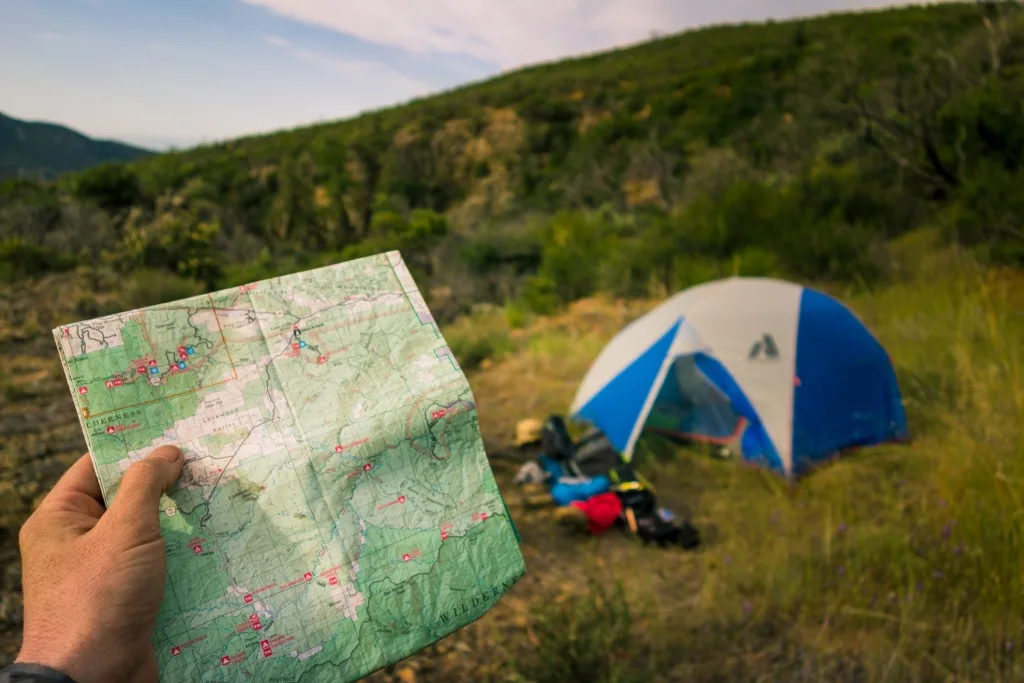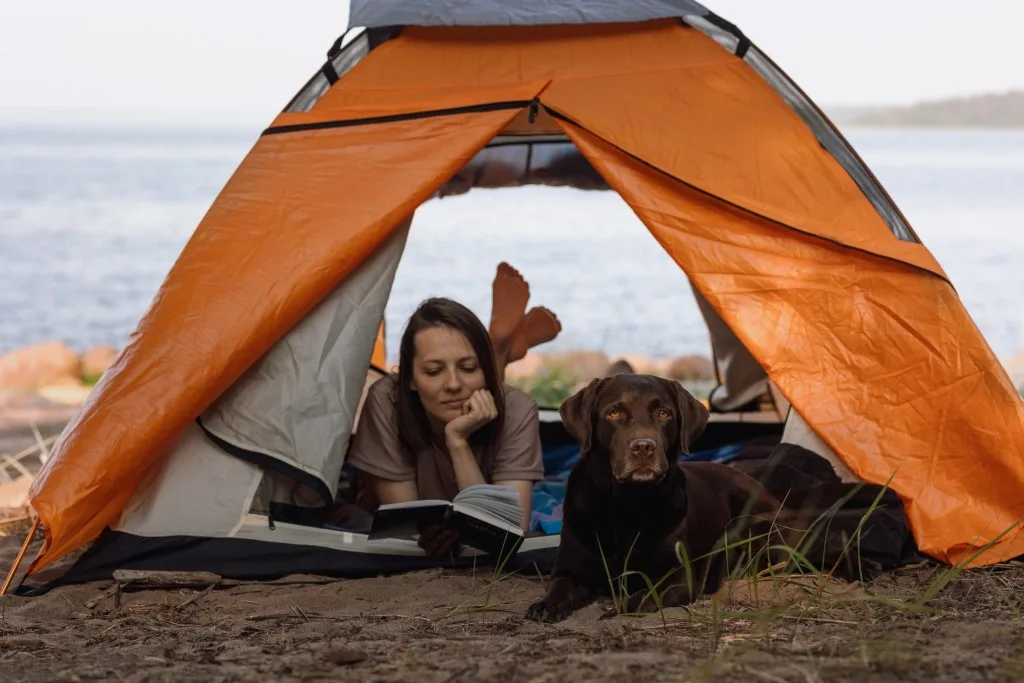There’s a big difference between a National Park campground and primitive camping. They may both be camping, but they’re two completely different styles.
If you want to disconnect and enjoy some privacy while in nature, true primitive camping is an excellent option to consider.
So what exactly is primitive camping? Let’s take a look!
What Is the Difference Between Camping and Primitive Camping?
When a friend or co-worker tells you they’re going camping, this typically means they’ve booked a campsite at an established campground. This could be a state park or private campground, but there are often a few amenities like running water, shower/restroom facilities, and electricity.
Some campgrounds have sites that they consider primitive campsites. This typically means there’s no water or electricity at the site. You’ll likely have access to a bathroom or running water, but just not at your site. However, this is not the true definition of primitive camping.
True primitive camping is a bit more extreme. You’re hiking or driving to very remote locations. Many campers prefer to be as far from civilization as possible. Some national or state parks refer to this camping style as backcountry camping.
You’ll need to be self-sufficient and carry all your supplies with you.

What Do I Need for Primitive Camping?
Before you head off into the wilderness, make sure you have the proper gear. Having the appropriate supplies can make or break your camping experience. You not only want to be comfortable but safe as well.
One of the most important items you’ll need is a tent or other structure for shelter. This will be your home away from home while in the wilderness. It can be a standard tent or rooftop camper, but having a safe place to sleep and escape the elements is essential. A sleeping pad, pillow, and sleeping bag can go a long way at the end of a long hiking day.
Think About Water
Also, plan what you will eat and drink. A gallon of water weighs approximately 8 lbs, and it’s not likely going to be possible to carry a generous amount of water if you’re hiking. So, make sure you bring purification tablets or a means for purifying water.
If you’re planning to catch your meals, bring the appropriate fishing or hunting gear and the tools needed to prepare your meals. If your food requires heating, you’ll likely need to bring tools to start a fire quickly.
Keep it simple and avoid carrying loads of extra heavy utensils and other food prep items.
Safety First
Safety should always be a top priority no matter where you’re primitive camping. Have a basic first aid kit in case of an emergency. Also, include bug spray, sunscreen, and any medications you might need. If you’re camping in bear country, make sure you have bear spray and any other items you might need to protect yourself from wildlife.
Don’t forget to check and see if you’ll need to obtain a backcountry permit. Some locations require you to register with rangers before heading out into the wilderness. This helps them know where you plan to be if there is an emergency and they need to go looking for you.

Is Primitive Camping Safe?
Preparation is the key to staying safe while enjoying primitive camping. You must know the weather conditions and stock up on the appropriate supplies before heading out to camp. The weather will greatly determine what supplies you’ll be needing while you’re out in the wilderness.
One of the biggest mistakes campers make is biting off more than they can chew when it comes to their skills. It’s best to work your way into primitive camping and slowly extend the length of your trips as you develop your survival skills and acquire supplies to make camping easier. If you’re new to camping, stick to shorter trips in less remote areas.
You don’t want to find yourself in a sticky situation in a location with limited cell coverage or a considerable distance from help.
Pro Tip: Primitive camping helps you avoid places like these 10 Camping Spots Overrun This Year. Enjoy some peace and quiet on your next primitive camping trip!
What Do You Eat During Primitive Camping?
Primitive camping doesn’t mean you have to sacrifice the quality of food you’re eating. As long as there are no fire restrictions, you can often create a fire to cook or heat your food. Many campers will eat a generous amount of nuts and seeds, dried fruits, jerky, or dehydrated meals.
They’re relatively easy to carry and snack on during your adventures. Instant oatmeal is also very easy to prepare while camping.
If you’re camping in an area that allows fishing or hunting, you can even test your luck and skills. However, you can also pack some chicken, tuna, or other foil pouches for your mealtimes. These proteins can help ensure you have energy for the rest of your adventures.
How Can I Go Camping Without Running Water?
It might surprise you how easy it is to go without running water while camping in the wilderness. Using the restroom in the wild will be an adjustment, but it’s relatively easy. However, when it comes to the water that you’ll consume, you should make sure you have a way to purify water. You shouldn’t drink from any water source without purifying it first. It could contain harmful bacteria that could cause health issues.
There are several options for purifying your water while primitive camping. UV lights are very portable and can remove 99.99% of the dangerous elements often found in water. It takes about 90 seconds to use one of these lights to purify approximately 32 ounces of water.
Some straws are capable of producing the same results. You can bend down and drink from a lake or river and not worry about any contaminant issues. While purifying your water once took a lot more effort, it’s clear to see that technological advancements can make it very easy.

How Can I Camp Without a Refrigerator?
There are plenty of food options that you can carry and consume while camping that don’t require refrigeration. There are also some portable coolers you can use while camping to keep your food and drinks cold for up to 72 hours.
Some foods that don’t require refrigeration are cookies, crackers, potato chips, and bread. There are also meat packets that can stow away in your backpack or other storage that don’t require refrigeration. Don’t forget about vegetables. Many are great consumed raw and don’t require refrigeration.
Pro Tip: Want to go camping in your RV? Discover Is Primitive Camping in an RV Possible?
What Should You Not Bring Camping?
You don’t want to waste space or energy by carrying items that you won’t use. So you must pack for your trip with a purpose. Ensure that everything you’re adding to your supplies will get used or is essential. The added weight will weigh you down if you’re backpacking and make the trip more complicated than necessary.
Don’t forget that you’re camping. It’s not a fashion contest in the wild. It’s not necessary to pack multiple outfits; accessories like jewelry or makeup aren’t typically necessary either. You also want to consider that there’s a chance your clothing could get ruined. So, it may not be a good idea to wear your Sunday best while out in the wilderness.
Make sure the clothing you’re packing is appropriate for the environment. You want them to be lightweight and keep you comfortable should the weather not cooperate.
Is Primitive Camping Worth It?
Sometimes you just need to escape normal life and connect with nature. There’s something freeing about experiencing the beauty of raw untouched lands. Watching nature carry on seemingly unaware of the stresses of life that many of us carry can help us realize our stresses aren’t as big as we might think. They can inspire and motivate us to live life in a way that we never imagined was possible. Primitive camping and any other style of camping that helps us live a better life is most definitely worth it.
Does the idea of primitive camping appeal to you? Drop a comment below!
Discover the Best Free Camping Across the USA
To be honest with you, we hate paying for camping. There are so many free campsites in America (with complete privacy).
You should give it a try!
As a matter of fact, these free campsites are yours. Every time you pay federal taxes, you’re contributing to these lands.
Become a FREE CAMPING INSIDER and join the 100,000 campers that love to score the best site!
We’ll send you the 50 Best Free Campsites in the USA (one per state). Access the list by submitting your email below: